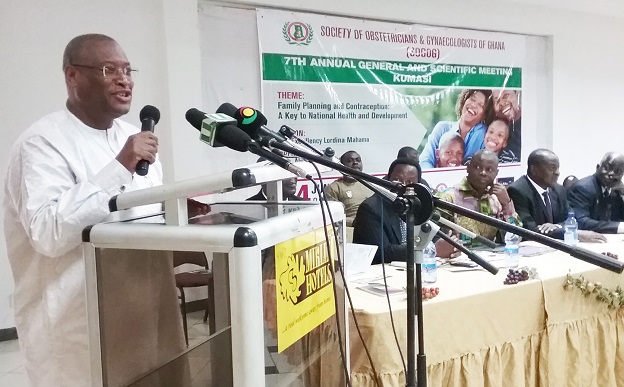
Government to revamp KATH, Bekwai maternity blocks
The maternity blocks of the Komfo Anokye Teaching Hospital (KATH) and the Bekwai Government Hospital, both in the Ashanti Region, are to receive facelifts to enhance healthcare delivery.
Advertisement
At the opening of the 7th Annual General Meeting and Scientific Meeting of the Society of Obstetricians and Gynaecologists of Ghana (SOGOG) in Kumasi, the Minister of Health, Mr Alex Segbefia, said the government was mobilising finances to help revamp the two facilities
He said issues on maternal health were of concern to the government and it would not sit on the fence as the two blocks needed urgent attention.
Unmet need for contraception
Representing both the First Lady, Mrs Lordina Mahama, and the Ashanti Regional Minister, Mr John Alexander Ackon, the minister indicated that surveys on women in developing countries suggested that a large percentage from 10 to 40 wanted to limit childbearing but were not using contraceptives - something he described as “unmet need for contraception”.
He described the theme for the meeting: “Contraception and Family Planning – A Key to National Health and Development” as poignant and appropriate, stressing that the country needed to pay attention to family planning and the use of contraceptives, since they were key to national health and development.
He said enabling women to make informed decisions on what time to have children, introducing measures to reduce unintended pregnancies, reducing abortions and maternal and newborn deaths were important.
That, he further emphasised, would increase education and economic opportunities for women and lead to healthier families.
He said it was unfortunate that more than 220 million women in developing countries who did not want to get pregnant lacked access to contraceptives and voluntary family planning information and services, and added that while the rate of contraceptive use in some of the poorest countries had stalled, an estimated 80 million women in developing countries had unintended pregnancy.
Access to information
The minister stressed that lack of access to information or services, lack of support from women’s partners, concern about health effects of contraception, insufficient donor and developing country funding, lack of reliable monitoring and data collection mechanisms, cultural and knowledge barriers, including myths on family planning and contraception, were other factors.
He said therefore that there should be high-level political commitment from government, broad coalition of support from elite groups, adequate funding, legitimisation of the idea of smaller families and modern contraception through mass media, among others.
He, however, challenged the SOGOG to continue to provide advocacy to support family planning, provide national leadership on discussions in increasing access to family planning, champion research into family planning and advocate for active male involvement in family planning and contraception.
Best strategies
The chairman for the occasion, Prof. Kwabena Antwi Danso, and the Chairman of the Local Organising Committee (LOC), Dr Frank Akobea, in separate remarks, called on the SOGOG to adopt the best strategies for the health sector in the area of fighting poor family planning and contraceptive usage.
The President of SOGOG, Prof. E.Y. Kwawukume, reiterated the need to give attention to abortion services, adding that SOGOG was at the core of women in health in terms of fertility and regulations on it.
Dr Anthony Enimil, who represented the Ghana Society of Paediatricians, indicated that unsafe abortion accounted for 12 per cent of maternal deaths in Ghana and called for collective measures to address the canker.



